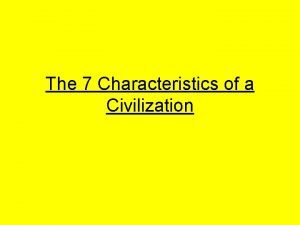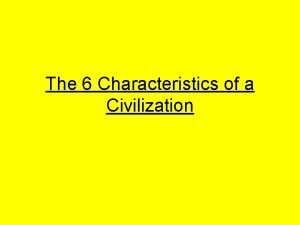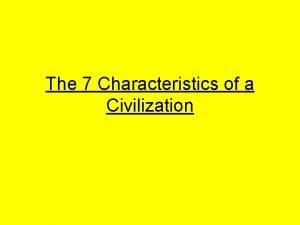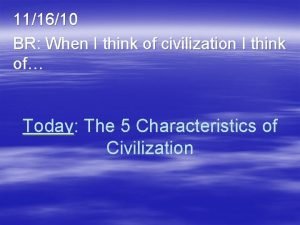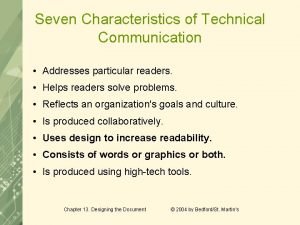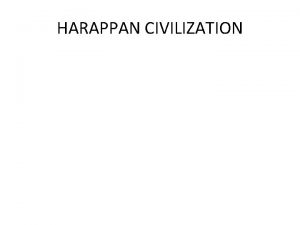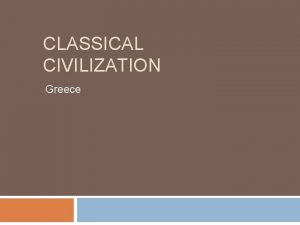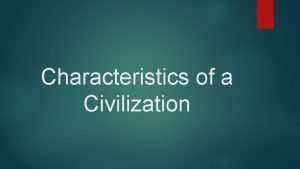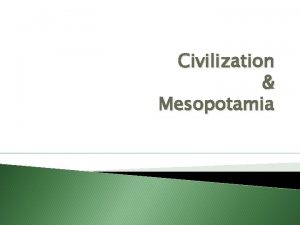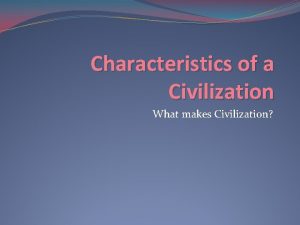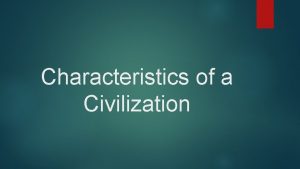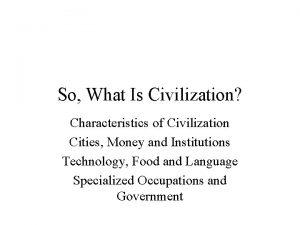The Seven Characteristics of a Civilization The Seven









- Slides: 9

The Seven Characteristics of a Civilization

The Seven Characteristics of a Civilization Historians can classify civilizations when they are able to distinguish these seven features: • Stable and Regular Food Supply • Specialization of labour/jobs • System of Government • Developed Culture (Arts and Architecture) • Structures in Society/Social Classes • Religious System • Writing Systems

Stable and Regular Food Supply • With farming began the shift from food gathering to food producing which meant that people could now be sure of getting enough to eat. A dependable source of food allowed people to settle in one place. • As food became abundant, communities began to flourish. Farming was a giant step towards the development of civilization. • Rivers allowed early farmers to water their land. This irrigation ensured a regular food supply and even surpluses that could be stored.

Specialization of Labour Job specialization: clear definition of different occupations within a society Ancient civilizations also developed an economy with specialized jobs. With more food and time to spend on activities other than farming, permanent jobs developed that focused on specific trades. One important trade group was the artisan class. These laborers were skilled craftspeople who worked with metal to make tools, bricklayers who built walls and homes, and cloth workers who made textiles.

System of Government Government: system of rule over a community or civilization In order to solve problems that arose, ancient civilizations created governments. Governments established, enforced, and evaluated laws and policies of the society. In addition, governments set up departments to accomplish the goals of government. For example, there were departments that recorded the laws of society, collected taxes and grain, or managed the construction of public works projects (road, buildings, irrigation etc. ). People subscribe to government to benefit from the rule of law.

Developed Culture: Arts and Architecture Arts and Architecture: the defining characteristics of a culture's creativity (art, music, architecture, written work) Allows historians and other people to see the unique features of a culture. In order to increase their favor with the gods, ancient peoples erected temples and monuments for worship. Monuments were also created to display the wealth and power of rulers. People devoted more time to cultural activities. With a steady source of food, people spent more time enjoying life. They danced, sang, wrote literature, and took part in many other forms of fun because they were not overwhelmed by hunger.

Structure in Society: Social Classes Social classes: breakdown of populations according to social standing or level of wealth Specialization of labor also led to the creation of different social classes. Religious figures like priests and government officials typically were at the top. Next came a small class of merchants and military officers, followed by the artisan class. At the lowest level were peasants. In many civilizations, slaves were at the bottom of the social order. Slaves were obtained from the spoils of war, slave markets, by their family members to pay off family debts, or from criminal punishment.

Religious System Religion: system of beliefs which usually involve a belief in a higher power or supernatural force As early civilization centered on the earth for survival, many civilization worshiped gods connected to land, water, and sky. Unlike popular religions today, ancient peoples were polytheistic, they worshiped many gods. For example, ancient Egyptians worshiped Osiris the river and afterlife god, Amon-re the sun god, and Isis the fertility god. Religion has been a unifying force in many civilizations while in others it has served to divide.

Writing Systems Writing systems: systems that use symbols to represent spoken sounds. Writing was used to communicate laws and orders, manage business and trade, and pass down cultural practices and ideas to future generations. At first writing was pictographic, which means whole pictures represented a noun or verb. As time passed, writing became alphabetic, a system in which symbols represented sounds of words. Typically, communications were written on clay tablets, but ancient civilizations like the Egyptians also used papyrus paper.
 Maya social structure
Maya social structure What are the 7 characteristics of a civilization?
What are the 7 characteristics of a civilization? List the 6 characteristics of a civilization
List the 6 characteristics of a civilization Which is a characteristic of civilization
Which is a characteristic of civilization 7 characteristics of civilization
7 characteristics of civilization 5 characteristics of civilization
5 characteristics of civilization Characteristics of roman civilization
Characteristics of roman civilization Seven deadly sins and seven heavenly virtues
Seven deadly sins and seven heavenly virtues Characteristics of communication
Characteristics of communication Describe the nature of the canaanite religion
Describe the nature of the canaanite religion

